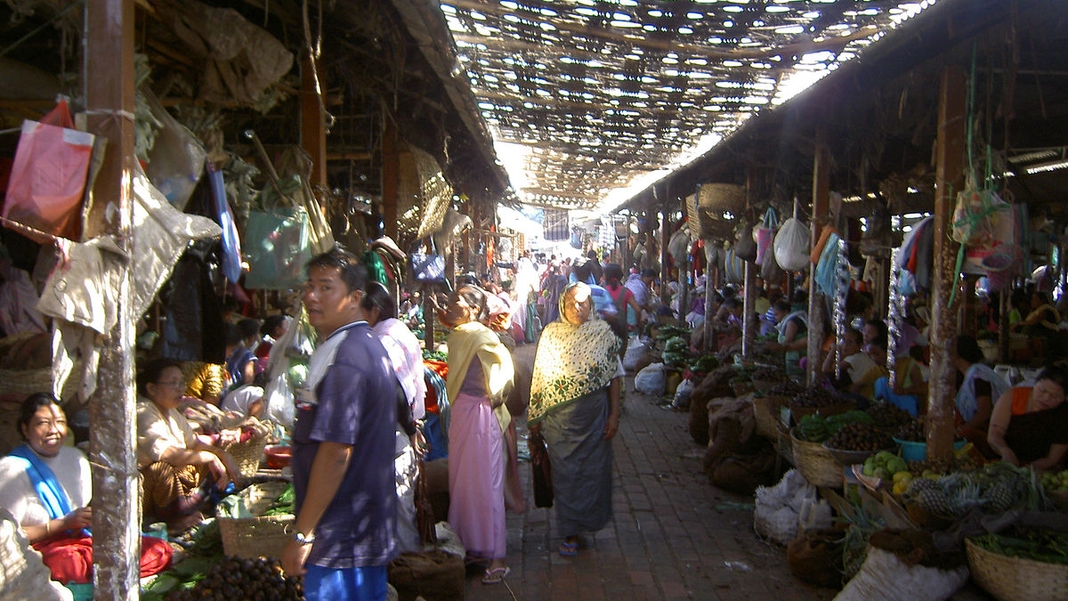Imphal, July 15: Over 500-year-old world’s largest all-women-run market in Manipur’s capital Imphal re-opened from Monday after 11 months, cheering over 3,600 women traders.
The “Ima Market” also known as “Ima Keithal” or “Mothers’ Market” had remained closed since March 21 last year as precautionary measures amid the outbreak of the Covid-19 pandemic.
Manipur Chief Minister, N. Biren Singh, who was the chief guest at the function for re-opening of Ima Market, announced that women vendors of the market would be exempted from vendor license fee for the year.
“The government took the decision considering the hardship faced by the women vendors during the Covid-19 pandemic as the markets remained closed for nearly a year,” he said.
The Chief Minister also appealed to the women vendors to allot a day to the government once in a month for maintenance and cleaning work of the market areas.
Singh later in a tweet said: “Extremely glad to re-open Ima Keithel, Imphal from today with Covid situation significantly improving. Timely closure of Ima Keithel from March 21, 2020 helped control spread of the pandemic up to a large extent. Thanks to all the Imas for their unstinting support & cooperation.”
Following the shutting down of the trading activities in the big market, the economy of the entire state was badly hit, especially the women vendors of the “Ima Market”, who are the sole bread earner of their family.
Economy hit hard by shutdown
An independent study done by social researcher, Serto Tondana Kom revealed that the closure of the large market has caused a loss of Rs 3,879 crore after it was closed down for almost a year.
The study further stated that a total of 3,614 license holder women vendors registered with the Imphal Municipal Corporation and who has stalls at Ima market had faced severe hardships to run their families and the women vendors pursued the state government continuously to allow them to restart their business.
Septuagenarian Laishram Mema, who has been a vendor at the “Ima Market” for the past 45 years, said, “After the government announced the lockdown in March last year the daily wage earners were severely affected.”
“The well-to-do vendors are doing relatively well. But a large number of Imas are facing a serious hardship to run their families. Though the state government had arranged bank loans for over a hundred vendors but the economic hardships of many hit the various activities including education and medical treatment of many families.”
Observations and comments by intellectuals
Imphal based renowned writer and political commentator, Iboyaima Laithangbam said that
“Ima Market” has three different complexes in the same area selling consumer items, local Manipuri items and products and mixed goods including clothing.
“Since British period, the Ima Keithel is not a simple marketplace or trading hub, this is an apex center for the campaign on various societal issues and against harmful happenings and unsocial activities,” he said.
He said that the Ima Keithel market has over the centuries been playing a pivotal role in empowerment of the women in the male dominated Manipuri society.
“For the socio-economic development of the Manipuri women the world famous market has always been playing a pioneering role,” Laithangbam said.
Another Manipuri intellectual and writer, Rajkuamr Kalyanjit Singh said that men can purchase anything from the “Ima Market” but they cannot be a vendor or seller.
“Manipuri women wearing their traditional attires operate their shops and stalls and occasionally organised various traditional festivals and events. The women vendors helped each others’ necessities and guide the new vendors in doing the business,” Singh said.
The vendors in the “Ima Market” are known as ‘imas’ or mothers, and the majority of the sellers are between the ages of 50 and 70 years.
Singh, editor of Manipuri newspaper “Marup”, said that in 1891, the British introduced stringent political and economic reforms leading to adverse impact on the market.
“Several measures including high taxation were imposed that eventually troubled the socio-economic fabric of the state in general and Manipuri society in particular.”
“All these led to the formation of the ‘Nupi Lan’ (Women’s War) movement in 1939 to revolt against the atrocities of the British. Protest rallies, mass gatherings and campaigns were held to denounce the British policies and measures.”
“The British, in order to thwart the agitation, tried to sell the market’s buildings to external buyers and foreigners but women of Manipur stood against the British and defended their market aggressively,” the veteran scholar said.



